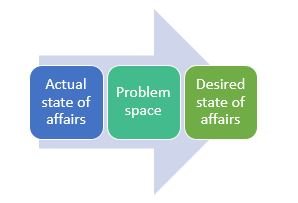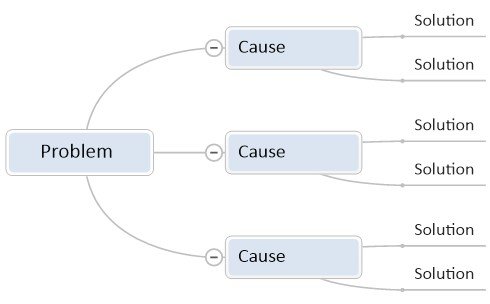How to Stop Worrying
How to Stop Worrying
Here is a good motto:
"Remember, it is foolish to fret and worry. Instead, identify the problem, Formulate your best plan, Then overwhelm your troubles with intelligent action".
Many people spend too much valuable time, fretting and worrying.
They spend too much time fretting and worrying over things which have happened, in the past; may yet happen, in the future; and even over things which they have no power to change. Fretting and worrying doesn't change anything other than your emotional state.
Fretting and worrying makes you feel worse, and yet it does nothing to improve the situation. So that is why we write, 'Remember, it is foolish to fret and worry'.
Don't fret and worry, instead identify the problem
In order to solve a problem, it is first necessary to identify its exact nature. The problem can be defined as the way to get yourself from "the actual state of affairs" to "the desired state of affairs".

As a problem solver, your mission is to find ways to fill-in the middle ground between the two states, to build a bridge that will allow you to get from your actual state of affairs to your desired state of affairs.
And to do that you must understand: exactly what is your current condition and what is your desired state.
And once you know that, you can start to fill in the middle ground with a plan of action.
Measure the actual state of affairs
If you want to lose weight, you need to know exactly how heavy you are now.
If you want to increase your wealth, then you need to draw up a financial statement that tells you your current net-worth.
If you want to improve yourself, in any realm, then your first step is to look at yourself honestly and judge your current condition.
This act of measuring your current condition is sometimes emotionally painful. But you need to know your current status.
Define the desired state of affairs
The next step is to decide what your desired state is. What do you want. Write down exactly, what your desired state is. If possible, ascribe a set of numbers to the goal.
- If you want to be richer, then how rich is that? Put a number on it.
- If you want to be faster, then how fast is that? Put a number on it.
- If you want to be better, then how much better? Put a number on it, if possible.
If it is not possible to put a number on the goal, then describe the goal in words, or draw a diagram or a picture of it. You need to really understand at a deep level what you will accept as a successful outcome.
If you don't know what you will accept as "success", you won't know when you have achieved it.
Fill in the problem space
In order to know what the problem space is, you may need to answer this question.
What are the three major causes of the problem?
Let us assume that all problems have causes, and that most problems have more than one cause. Let us assume that your problem has at least three causes. Write down the three main causes.
For each cause, there are at least two or more solutions. Write down the six solutions suggested by the three causes.

When you have a list of six possible solutions, pick the best selection and make that the basis of your plan of action. Next,
Formulate your best plan, then overwhelm your troubles with intelligent action
Once you have your plan, then immediately, swing into action!
Don't wait; Don't worry; Don't wonder if it will work or not; Instead, test it.
Test the plan and you will see if it works or not
The truth will probably be that your plan will partially work.
You'll make some progress, but not as much as you hoped. So then you reiterate the process.
If you don't make as much progress as you had hoped, then, re-formulate your best plan, and continue to then overwhelm your troubles with even more intelligent action.
Overwhelm your troubles with intelligent action
Rather than feeling overwhelmed BY your troubles, you should instead OVERWHELM your troubles.
Most problems are solvable
Remember, most problems are solvable; but only if you correctly apply the correct actions, taken in the correct order.
So, in order to achieve the desired result, you need to think it through, step by step.
Think through your problem, step by step
Take only informed, intelligent action. Intelligent action is gained only through intelligent thought. It is not gained through fretting and worrying.
So remember...
It is foolish to fret and worry.
Instead, identify the problem,
Formulate your best plan,
Then overwhelm your troubles with intelligent action.
Definition: problem-solving plan
A problem-solving plan is a step-by-step method used in personal development. First, you measure your real state in clear terms. Second, you set a precise goal for the state you want. Third, you map the chief causes and list practical fixes. Fourth, you act at once, test results, and adjust until the goal is met.
Show CG4D Definition
- Begins with an honest measure of the current state
- Sets a clear, number-based goal for the desired state
- Maps root causes and lists at least two fixes for each
- Moves quickly into action, testing and refining until the goal is reached
Article Summary
Stop worry in its tracks: name the real problem, measure where you stand, set a clear goal, build a simple plan, act today, test tomorrow, and repeat; action, not rumination, calms the mind and moves you forward.
Frequently Asked Questions
Here are some questions that frequently get asked about this topic during our training sessions.
Why does the article say worrying alone never solves anything?
What is the first problem-solving step the article recommends?
How do I work out my actual state versus desired state?
Why does the article stress giving goals numbers?
How do I list root causes and matching fixes?
What if my plan only works halfway?
How does quick action help reduce worry?
Thought of something that's not been answered?
Did You Know: Key Statistics
In 2024, the UK Office for National Statistics reported that 37% of adults felt high levels of worry on at least one day in the past week, a fall from 45% in 2021. A 2024 American Psychological Association study found that people who used a step-by-step problem-solving plan cut their self-reported worry by 27% after eight weeks.Blogs by Email
Do you want to receive an email whenever we post a new blog? The blogs contain article 5-10 minutes long - ideal for reading during your coffee break!
Further Reading in Personal Effectiveness
-
Get Better Results by Taking Better Actions
Want better results at work and life? Learn how daily study and self-improvement help you take better actions and see gains fast. Try our free quiz today.
Read Article > -
How good are you on a bad day?
Learn how to stay positive on a bad day with five clear steps: hold your goal, break tasks down, act fast, avoid numbing habits and lean on upbeat people.
Read Article > -
How to improve your personal effectiveness
Learn how personal effectiveness grows when you set clear goals, work to top standards, use better tools and order tasks well to save time and boost output.
Read Article > -
How to Stop Worrying
Learn how to stop worrying by spotting the real problem, setting clear goals, drafting a rapid action plan and testing it until anxiety gives way to steady, ver
Read Article > -
Sustainable Success
Learn sustainable success: work hard, rest well, avoid burnout. Get a simple formula to guard mental and physical health and keep high output for decades.
Read Article >
Looking for Personal Development Training?
If you're looking to develop your Personal Effectiveness Skills, you may find this Personal Development Training Course beneficial:
Open Training Course Pricing and Availability
Next Open Course Starts in 11 days, Cheltenham Gloucestershire, places available







